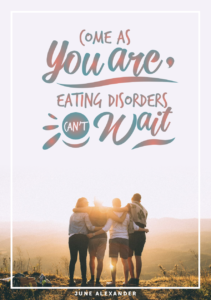Men and boys get eating disorders too – Sam wants you to know

Men and boys get eating disorders too – Sam wants you to know
“Men Get Eating Disorders Too” was my mantra for 11 years. It’s not simple words, but is a statement. That has meaning. I was one of those men with an eating disorder. There’s no denying the impact it had. Or feeling like I was the “only one”.
My story begins when I was 13 years old. I ran out of lessons and avoided class completely, due to the bullies. The only place I could find sanctuary was the boys toilets, where I knew I wouldn’t be found. It was there I would binge eat on the contents of my lunch box. Over time, this became a regular occurrence and evolved into bulimia.
As far as I was concerned, this was something I only did. Something I had invented even. Little did I know it was an “illness”. I only came to learn that bulimia existed from reading an agony aunt column in one of my mother’s magazines. There was a letter from a single mother who had split up from her partner. After she put the kids to bed, she would binge and purge. I didn’t relate with her situation, but did with her behaviours. And that’s how I came to realise I was bulimic.
Instead of getting help, it fuelled the bulimia. Gave me permission to continue. To self-harm, even. My first boyfriend “caught me in the act” as it were, several times. I was in denial. I certainly wasn’t going to open up to him, knowing it was destroying our relationship.
At 18, I attempted to seek help without success. All the doctor focused on was the depression. Not the bulimia. Upon reflection, I thought if I was a woman with the same symptoms and situation, would I have been able to the help? That’s what led me to create a movement for men and families affected to speak up and get their voices heard.
Now 33, I don’t pretend to be ‘fixed”. Far from it. What I’ve realised is that our underlying issues manifest in all sorts of ways. Bulimia is only one aspect of my experience.
The most important message is: if nothing changes, then nothing changes. Only we can be responsible for ourselves and our recovery.
No matter your age, ethnicity, religion, social class or gender – eating disorders do not discriminate. We all can be, and are, affected.
About World Eating Disorders Action Day 2019
This year grassroots activists, volunteers, and over 250 organizations in 40+ countries are calling for caregivers to receive support, health care workers to be properly trained, and access to immediate, evidence-based treatment.
Why We Can’t Afford to Wait
- Worldwide over 70 million people are estimated to be affected by an eating disorder,
- Eating disorders have the HIGHEST MORTALITY RATE of any psychiatric illness
- Eating disorders affect people of all genders, sexual orientations, ages, socioeconomic class, abilities, races, and ethnic backgrounds. It is time to take action.
- Good news! When treated EARLY and correctly, eating disorders have the highest and fastest recovery rate!
How to support World Eating Disorders Action Day, June 2, 2019
- Join the movement, show your purple on social media! Use hashtag #ShowUsYourPurple
- Follow conversation on social media. Use hashtags #ShowUsYourPurple #WeDoActNow
- Host or attend an event. See http://www.worldeatingdisordersday.org/2019-events-2/
- Donate. To support the work see http://www.worldeatingdisordersday.org/get-involved/participating-organisations/.
- Discuss eating disorders. Through open, supportive dialogue, we can create change.
E-book release: Come as you are, eating disorders can’t wait

As a Participating Organisation supporting 2019 World Eating Disorder Action Day, The Diary Healerhas released a new ebook, Come as you are, eating disorders can’t wait. Stories from around the world illustrate that recovery from an eating disorder IS possible, at every age. The first step, is to seek help. Click here to purchase a copy for $9.97 (AUD) – all profits support eating disorder services.





